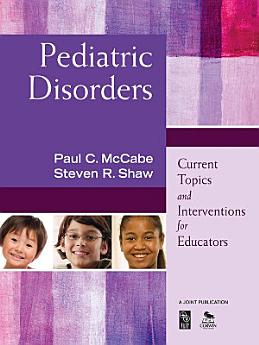Pediatric Disorders: Current Topics and Interventions for Educators
About this ebook
—Katy Olweiler, Counselor
Lakeside School, Seattle, WA
"Outstanding on multiple levels. It is a quick read for busy pre-practitioners and practitioners who are increasingly in need of accurate and current information regarding children′s health issues. The book also presents thought-provoking questions for professional growth or group discussions. The handouts afford the reader a unique mechanism for sharing the book′s contents with parents and colleagues."
—Doris Paez, Associate Director, Forsyth Futures
Consulting Psychologist, Winston-Salem Forsyth County Public Schools, NC
The educator′s go-to reference for important pediatric health topics!
Medical issues in schools are a growing reality. In addition to teaching academic skills, educators now play an integral part in comprehensive health care delivery for children. Based on current research, this volume outlines the most current and urgent pediatric issues affecting schools today.
Written for school psychologists, counselors, administrators, and teachers, this easy-to-understand resource covers:
- Schools as partners in health care delivery, including health care delivery trends and collaborations between educators and medical professionals
- Current issues in pediatric disorders and treatments, such as childhood immunizations, shaken baby syndrome, sleep problems, and pediatric HIV
- Prevention and wellness intervention for childhood obesity prevention, low-level aggression in the schools, and accident prevention
Featuring case studies, classroom strategies, discussion questions, glossaries, and handouts, Pediatric Disorders provides valuable information to practitioners involved in providing differentiated instruction and educational accommodations, collaborating with families, working with the community, and influencing policy.
About the author
Paul C. McCabe, NCSP, is an associate professor of school psychology in the School Psychologist Graduate Program at Brooklyn College of the City University of New York. McCabe is a New York State certified school psychologist, New York State licensed psychologist, and a Nationally Certified School Psychologist (NCSP). He serves on the editorial boards of several publications in school psychology and developmental psychology, and has consulted at state and national levels on issues of early childhood assessment and best practices, pediatric issues in schools, and training in school psychology. McCabe conducts and publishes research in early childhood social, behavioral, and language development and concomitant problems; pediatric school psychology and health issues addressed by schools; and social justice issues in training, especially training educators to advocate for gay, lesbian, bisexual and transgendered youth. McCabe received his PhD in clinical and school psychology from Hofstra University. He holds undergraduate degrees from University of Rochester and Cazenovia College.
Steven R. Shaw, NCSP, is an assistant professor in the Department of Educational and Counselling Psychology at McGill University in Montreal, Quebec. He has been a school psychologist since 1988 with clinical and administrative experience in schools, hospitals, and independent practice. He has conducted workshops and consulted with educational policy makers to address the needs of children with borderline intellectual functioning in the US, Canada, Pakistan, Moldova, Poland, India, and Egypt. Shaw conducts and publishes research in behavior and language development in children with rare genetic disorders; resilience factors for children with risk factors for school failure, especially borderline intellectual functioning; and pediatric school psychology and health issues addressed by schools. Shaw received a PhD in school psychology from the University of Florida.







